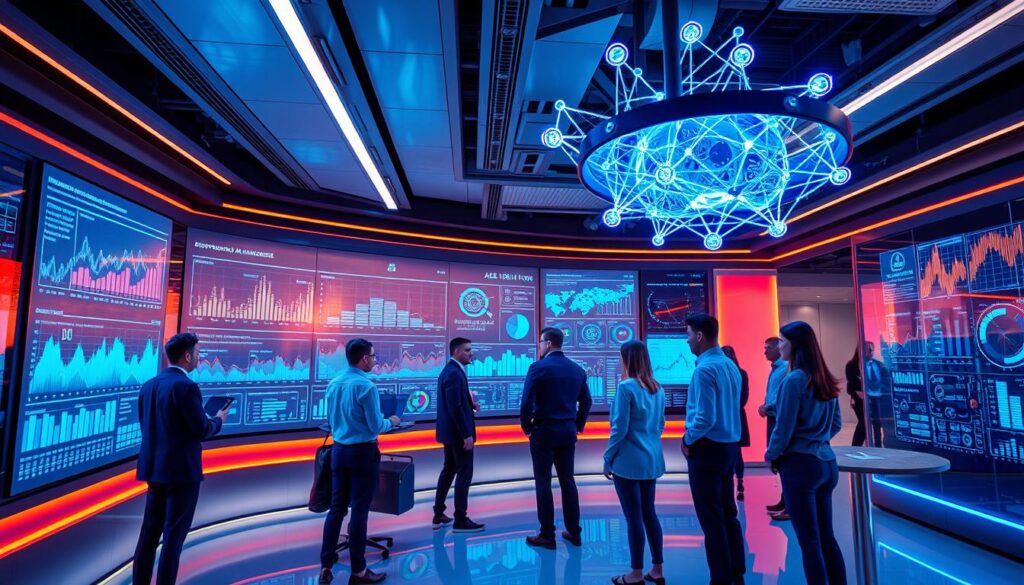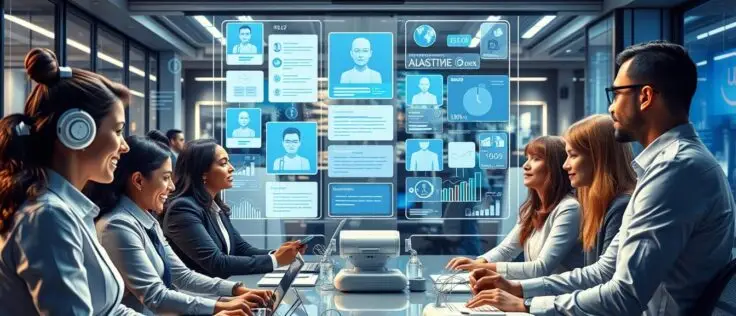Could Artificial Intelligence mark the beginning of a new chapter in how we recruit and find talent? It promises a big shift in how we’ve always hired and kept employees engaged. Now, 26% of organisations use AI to improve HR tasks1. The job of looking at resumes, once just a quick glance, is changed by AI. These algorithms sort through data quickly and accurately1.
This shows just one way AI is changing Human Resources. It’s leading a revolution that will change how we view recruitment, talent getting, and managing employees.
HR pros are seeing big changes in how work is done and how they use data3. It’s a big shift in managing people at work.
The Evolution of Talent Acquisition Through AI
Artificial intelligence (AI) is changing how companies hire and plan their recruitment strategies. By using AI, firms are making their hiring methods faster and more precise. They use predictive hiring and smart talent finding to get there.
Automating Resume Screening for Efficiency and Accuracy
AI has transformed resume screening into a quick and precise task. It analyses resumes much faster than humans. This means companies can quickly find the best candidates by looking at many details, beyond what’s usual. Now, 42% of big organisations see their hiring improve with AI4.
Tools that automate screening are great at removing bias. They match candidates based purely on skills and background. 50% of HR experts say this is crucial to meet today’s talent needs4.
AI-Driven Predictive Hiring and Candidate Profiling
Predictive hiring uses data to guess how well someone will do in a job and fit into the company culture. AI examines online profiles, engagement, and past jobs to do this. 55% of HR leaders used this data to make better hiring choices in 2020. It shows how AI is becoming a key part of hiring4.
The Role of AI Tools in Strategic Talent Sourcing
AI is changing talent sourcing by searching the world for the best candidates. It decides the best times to hire too. AI helps HR people understand complex job markets by managing and analysing big data. This leads to proactive talent finding. Impressively, 66% of HR workers think AI will let them hire more without growing their teams. This highlights AI’s efficiency in HR4.
Revolutionising Employee Engagement with AI Solutions
AI Solutions are changing how we train and develop employees, offering tailored learning that meets individual goals. This integration of AI into training lets companies keep up with trends while building a skilled, motivated workforce.
AI makes learning experiences more personal, which boosts employee engagement. Workers feel appreciated and become more satisfied and productive. AI tools spot skills gaps and provide relevant, engaging content, fostering a culture of constant learning and flexibility.
For more on how AI is improving business, especially in CRM, check out optimising client relations with AI-powered CRM.
Adopting AI Solutions makes Personalised Development common in the workplace. This strategy ensures everyone’s potential is fully used, pushing companies towards more success and flexibility in the changing market.
AI in Human Resources: Navigating the New Landscape
AI technology is changing human resources. HR professionals now need to use new methods that focus on workforce planning and integrating HR systems. They must not only embrace technology but also rethink HR’s role in both organisations and the lives of employees.
Integrating AI Tools into Existing HR Systems
By adding AI tools to HR systems, the change is smooth. Traditional methods get better, not replaced. AI automates simple tasks like initial candidate screenings. This helps HR focus on important duties such as promoting workplace culture and diversity.
AI’s use in HR is changing how tasks are done daily. It helps tackle employee issues early on and stops problems from growing7.
The Synergy of HR Professionals and AI Technology
HR experts and AI working together creates a powerful partnership. AI is great with data and making processes like promotions smoother at places like IBM7. But, HR staff is needed to make sense of this data and decide what to do next.
Also, using AI in HR is crucial for companies to stay ahead in today’s fast world. By employing AI, businesses see benefits like easier ways for retirees to return to work. This brings a rich mix of talent and experience7.
The combination of AI and human oversight leads to a better work environment. It’s effective and keeps up with changes in society and business. As AI use grows within HR, it’s key to find the right balance between technology and human touch. This approach helps in creating innovative and ethical strategies.
Advances in HR Analytics and Data-Driven Decision Making
HR Analytics are changing the game for human resources, making it a key player in business strategy. Companies now see huge benefits from using HR Analytics. They use it to improve how they hire and plan for future needs with better accuracy. As a result, 41% of HR experts have significantly improved how they work by using technology and data8.
Using recruitment data helps make hiring faster and more efficient, and helps manage talent better. By making decisions based on data, companies can cut the time and cost of hiring by up to 50% and 70%, respectively. This leads to keeping employees longer and making them more productive9.
Predictive Analytics is great not just for hiring but also for helping HR pros find skill gaps. They can make training more personalised and help with career growth. This is key for creating a skilled workforce, where everything is planned better thanks to data8.
Adding AI and machine learning to HR Analytics is totally changing the field. AI tools handle the boring tasks, freeing up HR folks for big projects. This has made HR a vital part of business strategy. AI and Generative AI are opening new paths for working with data8.
As businesses tackle the challenges of hiring and keeping talent, HR Analytics is becoming essential. Firms using AI in HR are seeing real results. This includes a big jump in how engaged and productive employees are, with a 70% increase in productivity for those using AI9.
Maximizing AI's Potential in Performance Management
Adding AI to Performance Management is not just about making old methods better. It’s about a whole change towards advanced performance strategies. AI changes how HR works, making feedback and evaluations better and fairer.

AI doesn’t just automate, it changes how we watch, judge, and boost worker’s efficiency. Recent studies show 76% of HR bosses think missing AI puts them behind10. These AI tools help stay in the race and prepare for the future market.
From Reactive to Proactive: AI in Performance Assessments
Using AI in assessments helps firms be more forward-thinking. With 52% of HR leaders looking into AI10, companies are ready to use AI Feedback Tools properly. These tools give constant feedback for ongoing learning and better performance.
AI Feedback Tools for Performance Improvement
AI also makes Feedback Tools that fully tackle performance. About 36% of HR leaders say AI can cut bias at work10. Using AI improves management quality and makes sure evaluations are fair.
With widespread use of these systems, 84% of HR leaders think AI boosts productivity by making HR tasks more efficient10. Automated systems lead to more detailed reviews, which help employees grow and develop professionally.
The Strategic Impact of Workforce Planning with AI
AI has changed how we plan for the future of work. It lets us predict what skills we’ll need and updates these predictions using new information. This means HR can plan for skill development better, keeping up with long-term goals11. Unlike old methods that update less often, this new way helps companies stay competitive.
AI also helps by analyzing lots of data to understand the skills employees have now. It can spot what skills are missing. For example, if a company needs more biotech knowledge for a project, AI can help plan how to get there11.
AI also creates learning programs that suit each person’s abilities and speed. This makes training more direct and effective11. Everyone gets the skills they need, which matches the business’s shifting needs and goals.
In summary, AI has made workforce planning way better. It aligns people’s skills with what the business needs, leading to better decisions and flexibility in a changing world. HR teams using AI are key players in planning for their companies’ futures. They ensure the workforce is ready for now and for what comes next11.
Enhancements in HR Automation and Employee Lifecycle Management
The HR world is changing fast, thanks to new tech in HR Automation and Employee Lifecycle Management. These advancements make work processes better and boost the Employee Experience from beginning to end.
Onboarding and Training Empowered by AI
AI is reshaping how new employees join a company. With AI, companies can quickly go through lots of applications, saving hours that used to go into manual checks12. AI also makes onboarding personalised with 24/7 chatbot help. This lets new staff easily fit into their roles and understand the company’s culture13.
AI suggests custom learning and growth paths based on what fits an employee’s career goals and job performance. This creates a cycle of ongoing improvement that helps both the workers and the company12.
AI and the Future of Employee Experience
AI’s role in Employee Experience is deep and wide. It spots possible satisfaction and job performance issues early, allowing companies to act before problems grow. This boosts staff engagement and keeps people working at the company longer12.
Generative AI changes how personal employee experiences are across their time at a company. It offers tailored career plans and promotes well-being and balance with smart analytics and tips13. With these techs, HR’s looking at new ways to measure and achieve worker happiness and success.
The Challenges of Implementing AI in HR
As HR teams add Artificial Intelligence to their work, it changes how they manage people. But adding AI to HR has big hurdles that need careful thought and planning.
Addressing Ethical and Privacy Concerns in AI Usage
AI can change how we hire and make work better, but it also brings up big ethical and privacy worries. Keeping personal info safe is very important for HR teams. This is because they have to follow strict data laws like GDPR and HIPAA14. If they don’t, they could lose a lot of money and hurt their company’s name14. Also, the risk of data leaks is always there, making strong security a must14.
Overcoming Resistance and Managing Change with AI Adoption
People naturally resist new tech, which can slow down adding AI to HR. To handle this, it’s vital to create a welcoming culture with clear talks and full training. Doing this can show the good points of AI, like better choices and treating employees as individuals. This could reduce worries and make adding AI easier15. It’s key to mix technology with a focus on people, so AI helps but doesn’t replace the human touch in HR.
In the end, the hurdles of adding AI in HR are tough but we can overcome them. We must carefully deal with ethical, privacy, and change resistance issues to make full use of AI in managing people. Building a trusting and open environment is crucial to beating these challenges. It ensures AI brings positive changes to our work goals.
AI's Influence on Diversity and Inclusivity in Hiring
Artificial intelligence is changing how companies hire, making it more inclusive. It helps firms improve diversity and fight against bias. Now, hiring focuses more on what candidates can do, not who they are. AI-driven systems make sure decisions are based on skills without considering age, gender, or ethnicity16.
AI ensures hiring is fair and helps with inclusivity after hiring. Virtual assistants and chatbots offer private support for diversity issues18. They help employees report problems, making the workplace welcoming for everyone. This support is key for a positive company culture.
Diverse teams are essential for making products everyone can use. They make products better and more people happy with them17. To learn more about how AI improves sales and marketing, go here: AI for Lead Generation.
Case Studies: Successful AI Integration in HR Departments
AI is changing how companies recruit, welcome new hires, and keep employees happy. SHRM says 79% of companies now use AI in their hiring processes19. This shows both the speed and quality of HR work are improving.
JustEat cut its hiring time in half, from 14 days to 7, by using AI chatbots. These bots make hiring faster and match people to jobs better19. IBM Watson Talent also helps companies find the right candidates quicker with its smart tech20.
These stories show how AI is making HR departments better across different fields. By using these smart technologies, businesses work better and create a team that’s diverse and engaged.
To find out how businesses use AI to get better results, read this deep dive into boosting sales by improving conversion rates with.
Conclusion
AI is changing Human Resources forever. It’s making hiring and keeping staff better and freeing HR to plan more. With tools for recruiting and talent spotting, HR folks can now make work better for everyone2223. Some challenges, like cost and needing skilled people, do slow AI use. Yet, the benefits, like saving time and improving staff hiring and happiness, are winning22.
AI also helps spot the best job candidates fast. It makes sure the right people get the job23.
Using AI in HR cuts costs and ups income, studies show24. It finds cost-friendly ways and picks out if someone might leave or where good hires come from24. AI helps HR get better at their job. It’s about hiring well and planning the workforce smartly. This pushes HR in the UK towards new, effective ways that meet fast-changing work and business needs222324.
FAQ
How is AI transforming the recruitment process?
AI changes recruitment by making tasks like screening resumes and initial interviews quicker. It ensures the right match between job and candidate, boosting efficiency. Also, it uses smart hiring to understand candidate qualities better and finds talents effectively, shortening hiring time.
What role does AI play in enhancing employee engagement?
AI boosts employee engagement by offering personal training and growth tools. These are based on their career interests. Such a tailored approach keeps workers motivated. It encourages them to gain new skills and grow professionally.
How are HR professionals leveraging AI in workforce planning?
HR experts use AI for better workforce planning, aligning it with company goals. It helps predict the need for staff and places them where they make a big difference. This ensures the success of the organization.
Can AI in HR analytics contribute to data-driven decision-making?
Definitely, AI in HR analytics deeply informs decisions with detailed analyses on hiring and performance. It spots trends and checks if recruitment methods work well. HR pros can then adjust their strategies to meet the changing job market.
How does AI support performance management?
AI helps manage performance by tracking it in real time and predicting future outcomes. It provides feedback tools for better growth paths. This way, employees can aim for realistic goals, leading to better performance management.
What are the ethical considerations when implementing AI in HR?
When bringing AI into HR, we must avoid biases and protect employee data privacy. We also need to think about the cultural impact of AI. It’s key to keep these actions ethical. This includes open discussions and sticking to moral standards.
How is AI contributing to diversity and inclusivity in hiring practices?
AI helps make hiring more diverse and fair by avoiding unconscious biases. It looks at applications based on data, offering a wider range of candidates. This ensures everyone has a fair chance during the hiring process.
What challenges do companies face with AI adoption in HR?
Introducing AI in HR brings ethical, privacy, and adaptation challenges. Companies worry about job losses and integrating AI with current systems. Finding a balance between AI and human judgment is hard but necessary.
How are companies overcoming resistance to AI in the workplace?
Companies fight resistance to AI by talking openly with their teams and educating them on AI’s advantages. They use change management to help everyone adjust. This shows that AI enhances human skills, rather than taking over jobs.
Source Links
- Council Post: How AI Can Enhance HR By Transforming Candidate And Employee Experiences – https://www.forbes.com/councils/forbeshumanresourcescouncil/2024/06/10/how-ai-can-enhance-hr-by-transforming-candidate-and-employee-experiences/
- How AI is transforming human resources and the workforce – https://www.consultancy-me.com/news/8749/how-ai-is-transforming-human-resources-and-the-workforce
- AI in HR 2024: How AI is Transforming HR Tech – https://www.theaccessgroup.com/en-gb/blog/hcm-ai-in-hr-2024-how-ai-is-transforming-hr-tech/
- The Role of AI in Talent Acquisition: Revolutionising Recruitment – https://karlwood-winchr.medium.com/the-role-of-ai-in-talent-acquisition-revolutionising-recruitment-40801ae1bbef?source=rss——-1
- AI in Human Resources: Revolutionizing the Workplace – https://mindtitan.com/resources/blog/ai-in-human-resources/
- Using AI to Revolutionise Human Resources – https://businessnewswales.com/using-ai-to-revolutionise-human-resources/
- Embracing AI’s impact on Human Resources dynamics – HRD – https://www.hrdconnect.com/2024/03/04/navigate-the-transformative-impact-of-ai-on-human-resources/
- What is data-driven decision-making in HR, and how is AI leveraging it? | 365Talents – https://www.365talents.com/en/resources/what-is-data-driven-decision-making-in-hr-and-how-is-ai-leveraging-it
- The Future of Artificial Intelligence in HR Analytics – https://vorecol.com/blogs/blog-the-future-of-artificial-intelligence-in-hr-analytics-8109
- AI in Human Resources: How To Maximize Its Potential – https://www.teamraderie.com/insights/ai-in-hr-how-to-maximize-its-potential/
- AI-Powered Workforce Planning: The Future of HR Strategies – https://www.linkedin.com/pulse/ai-powered-workforce-planning-future-hr-strategies-tom-daly
- Transforming Human Resources: The Impact of AI on HR Practices – https://www.linkedin.com/pulse/transforming-human-resources-impact-ai-hr-practices-zdmme
- Using Generative AI Across Moments that Matter in the Entire Employee Lifecycle – https://www.linkedin.com/pulse/using-generative-ai-across-moments-matter-entire-employee-lifecycle-tdhvc
- The Biggest Challenges And Pitfalls Of Data-Driven, AI-Enabled HR – https://www.forbes.com/sites/bernardmarr/2024/01/12/the-biggest-challenges-and-pitfalls-of-data-driven-ai-enabled-hr/
- The Benefits and Challenges of Implementing AI in HR Management | JoinIT – https://www.joinit.tech/blog/the-benefits-and-challenges-of-implementing-ai-in-hr-management/
- The impact of AI on diversity and inclusion initiatives in hiring – Express Computer – https://www.expresscomputer.in/guest-blogs/the-impact-of-ai-on-diversity-and-inclusion-initiatives-in-hiring/110312/
- Breaking Barriers: Exploring AI’s Impact on Inclusion Across Industries – https://www.techuk.org/resource/breaking-barriers-exploring-ai-s-impact-on-inclusion-across-industries.html
- The Role of AI in Diversity and Inclusion: Improving HR Practices for a More Inclusive Workplace – https://www.linkedin.com/pulse/role-ai-diversity-inclusion-improving-hr-practices-more-inclusive-rwwpc
- AI in HR Examples: 9 Companies Successfully Using AI Innovation in Key People Processes | Zavvy – https://www.zavvy.io/blog/ai-in-hr-examples
- AI’s Influence on HR Transformation: Case Studies – https://medium.com/@karthik66981600/ais-influence-on-hr-transformation-case-studies-f9c2663d694a
- The Future of AI in HRIS Systems: Transforming Human Resources Management – https://www.outsail.co/post/the-future-of-ai-in-hris-systems-transforming-human-resources-management
- 1808-2832792_Conversational AI and HR_Clean_READ_20Aug.docx – https://assets.ey.com/content/dam/ey-sites/ey-com/en_gl/topics/alliances/ey-the-new-age-artificial-intelligence-for-human-resources-010978-18gbl.pdf
- Rise of AI in HR: Shaping the Future of Work | Avado – https://www.avadolearning.com/blog/rise-of-ai-in-hr-shaping-the-future-of-work/
- AI and HR: The Impact of AI on Human Resource Management – https://borderlesshr.com/blog/ai-and-hr-the-impact-of-ai-on-human-resource-management/






